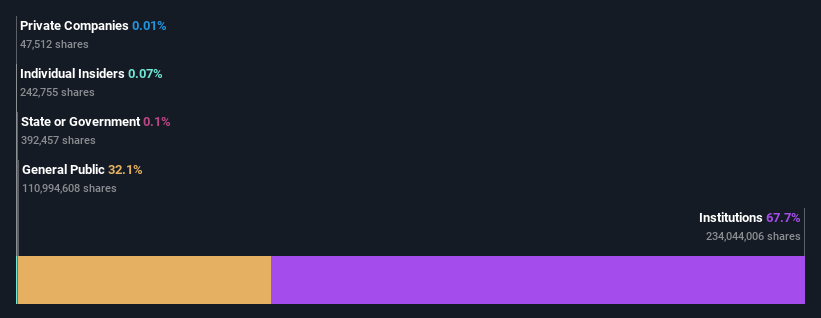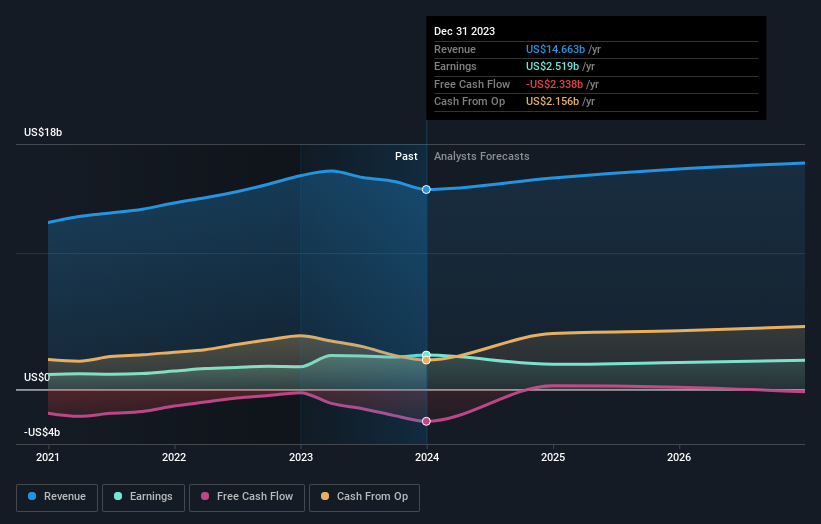Stock Analysis
- United States
- /
- Other Utilities
- /
- NYSE:ED
Following a 2.3% decline over last year, recent gains may please Consolidated Edison, Inc. (NYSE:ED) institutional owners

Key Insights
- Institutions' substantial holdings in Consolidated Edison implies that they have significant influence over the company's share price
- 48% of the business is held by the top 25 shareholders
- Recent purchases by insiders
Every investor in Consolidated Edison, Inc. (NYSE:ED) should be aware of the most powerful shareholder groups. And the group that holds the biggest piece of the pie are institutions with 68% ownership. Put another way, the group faces the maximum upside potential (or downside risk).
After a year of 2.3% losses, last week’s 3.4% gain would be welcomed by institutional investors as a possible sign that returns might start trending higher.
Let's delve deeper into each type of owner of Consolidated Edison, beginning with the chart below.
See our latest analysis for Consolidated Edison

What Does The Institutional Ownership Tell Us About Consolidated Edison?
Institutional investors commonly compare their own returns to the returns of a commonly followed index. So they generally do consider buying larger companies that are included in the relevant benchmark index.
As you can see, institutional investors have a fair amount of stake in Consolidated Edison. This can indicate that the company has a certain degree of credibility in the investment community. However, it is best to be wary of relying on the supposed validation that comes with institutional investors. They too, get it wrong sometimes. When multiple institutions own a stock, there's always a risk that they are in a 'crowded trade'. When such a trade goes wrong, multiple parties may compete to sell stock fast. This risk is higher in a company without a history of growth. You can see Consolidated Edison's historic earnings and revenue below, but keep in mind there's always more to the story.

Institutional investors own over 50% of the company, so together than can probably strongly influence board decisions. Consolidated Edison is not owned by hedge funds. The Vanguard Group, Inc. is currently the largest shareholder, with 12% of shares outstanding. In comparison, the second and third largest shareholders hold about 10% and 7.5% of the stock.
A deeper look at our ownership data shows that the top 25 shareholders collectively hold less than half of the register, suggesting a large group of small holders where no single shareholder has a majority.
Researching institutional ownership is a good way to gauge and filter a stock's expected performance. The same can be achieved by studying analyst sentiments. There are plenty of analysts covering the stock, so it might be worth seeing what they are forecasting, too.
Insider Ownership Of Consolidated Edison
The definition of an insider can differ slightly between different countries, but members of the board of directors always count. Company management run the business, but the CEO will answer to the board, even if he or she is a member of it.
I generally consider insider ownership to be a good thing. However, on some occasions it makes it more difficult for other shareholders to hold the board accountable for decisions.
Our data suggests that insiders own under 1% of Consolidated Edison, Inc. in their own names. Being so large, we would not expect insiders to own a large proportion of the stock. Collectively, they own US$23m of stock. It is good to see board members owning shares, but it might be worth checking if those insiders have been buying.
General Public Ownership
With a 32% ownership, the general public, mostly comprising of individual investors, have some degree of sway over Consolidated Edison. While this group can't necessarily call the shots, it can certainly have a real influence on how the company is run.
Next Steps:
While it is well worth considering the different groups that own a company, there are other factors that are even more important. Take risks for example - Consolidated Edison has 3 warning signs (and 1 which doesn't sit too well with us) we think you should know about.
If you are like me, you may want to think about whether this company will grow or shrink. Luckily, you can check this free report showing analyst forecasts for its future.
NB: Figures in this article are calculated using data from the last twelve months, which refer to the 12-month period ending on the last date of the month the financial statement is dated. This may not be consistent with full year annual report figures.
Valuation is complex, but we're helping make it simple.
Find out whether Consolidated Edison is potentially over or undervalued by checking out our comprehensive analysis, which includes fair value estimates, risks and warnings, dividends, insider transactions and financial health.
View the Free AnalysisHave feedback on this article? Concerned about the content? Get in touch with us directly. Alternatively, email editorial-team (at) simplywallst.com.
This article by Simply Wall St is general in nature. We provide commentary based on historical data and analyst forecasts only using an unbiased methodology and our articles are not intended to be financial advice. It does not constitute a recommendation to buy or sell any stock, and does not take account of your objectives, or your financial situation. We aim to bring you long-term focused analysis driven by fundamental data. Note that our analysis may not factor in the latest price-sensitive company announcements or qualitative material. Simply Wall St has no position in any stocks mentioned.
About NYSE:ED
Consolidated Edison
Consolidated Edison, Inc., through its subsidiaries, engages in the regulated electric, gas, and steam delivery businesses in the United States.
Average dividend payer and slightly overvalued.

